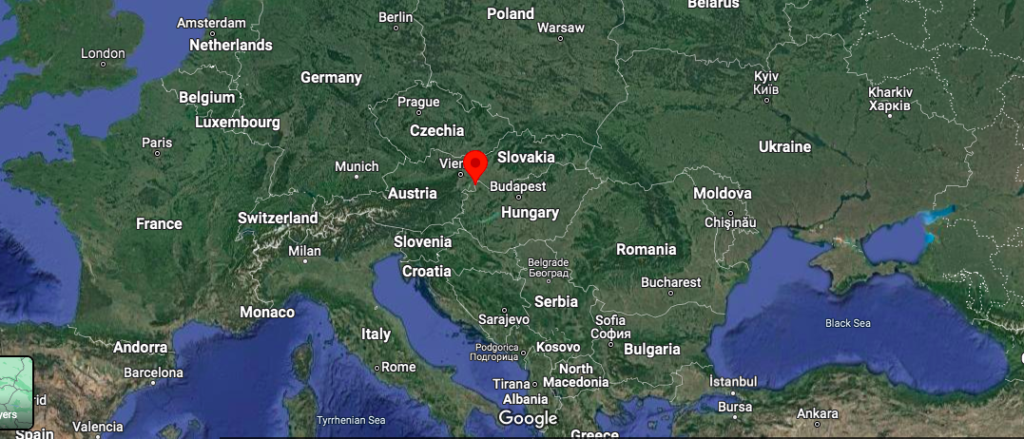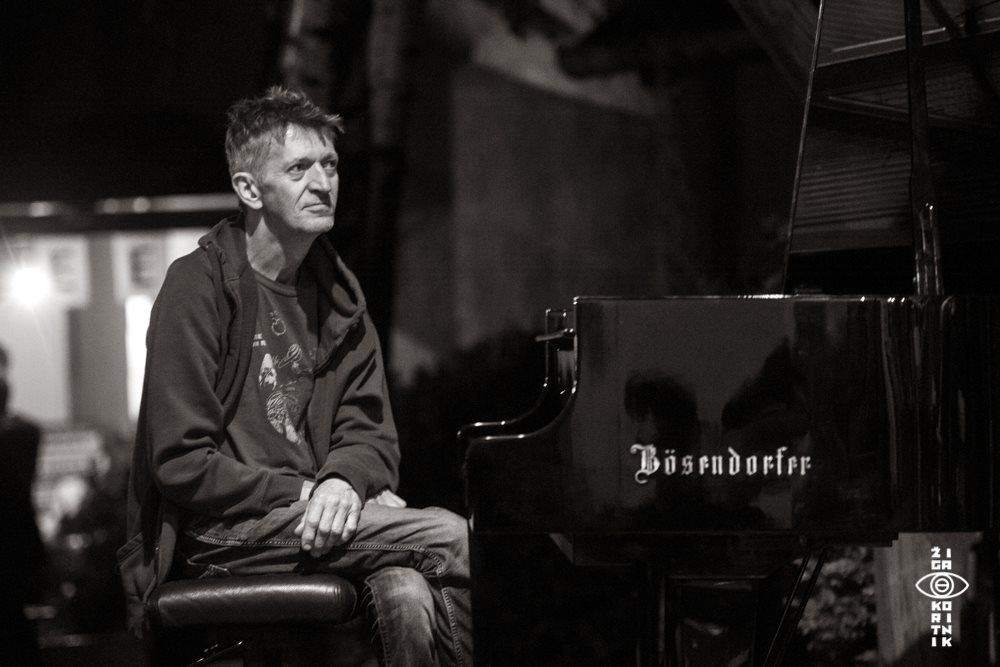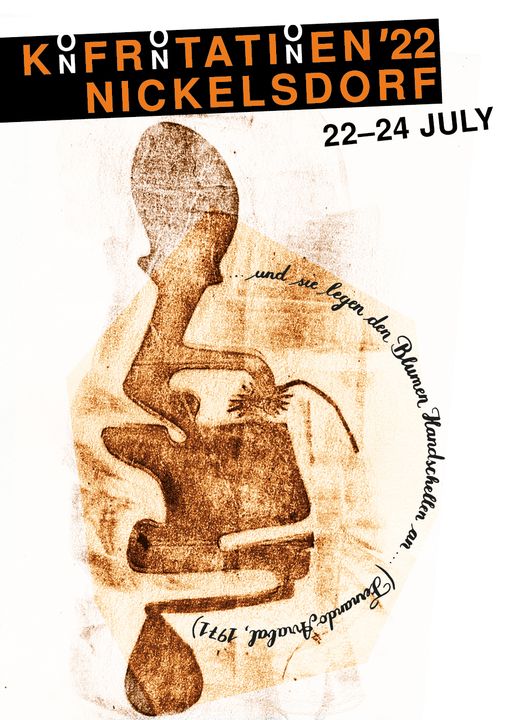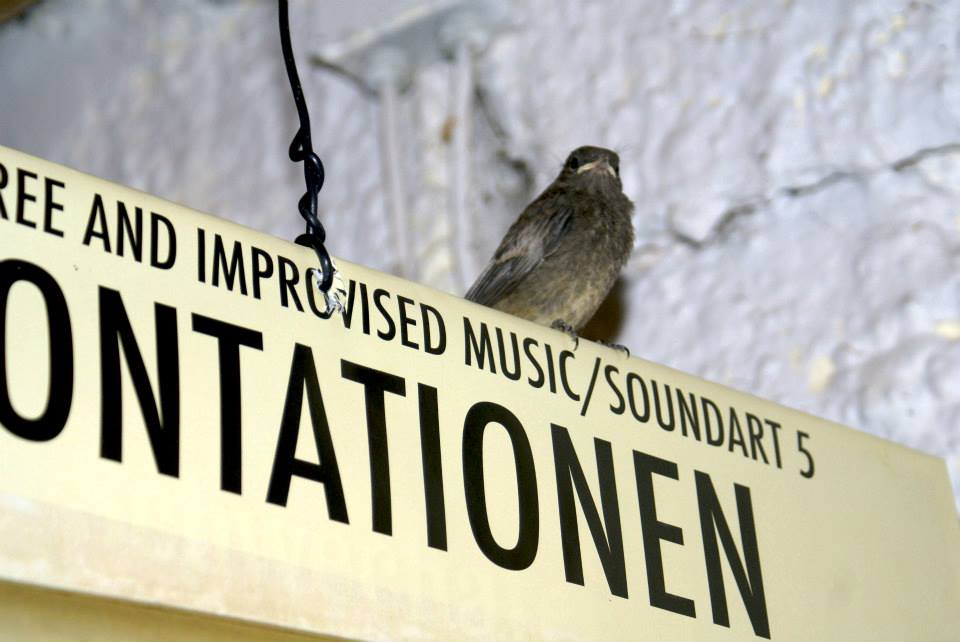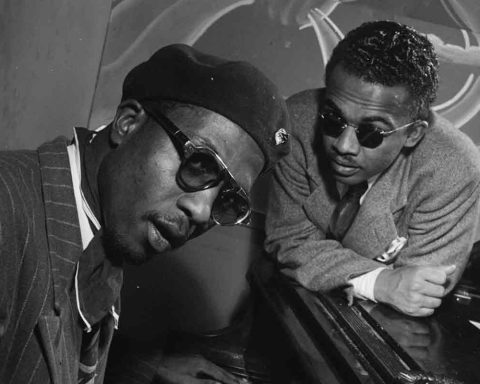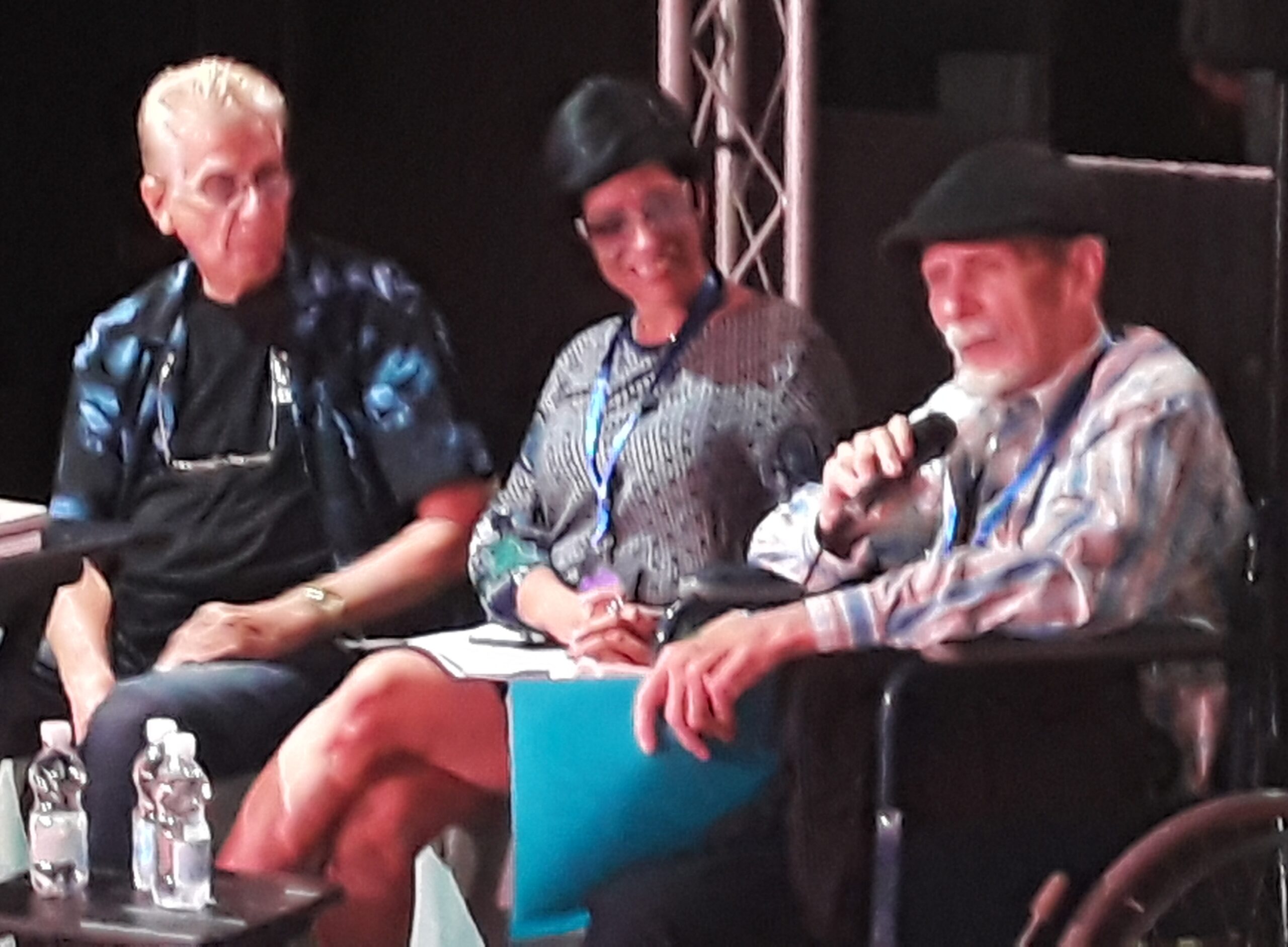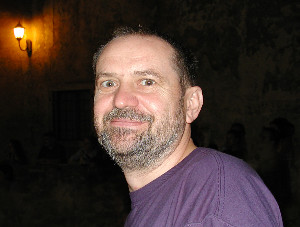“We’re one of the longest-running festivals in Europe, which by its 42nd edition doesn’t have to explain itself or its quality anymore,” grins Hans Falb, a founder and artistic director of Konfrontationen, a legendary Austrian festival of avant-garde jazz and beyond, held at the Jazzgalerie Nickelsdorf, scheduled for July 24.
Seventy-two kilometers from Austria’s capital, looking from the province of Burgenland across the Austrian-Hungarian border, Nickelsdorf is known as a settlement of Croats who fled from Turks a few hundred years ago. But Hauna (as he’s known in da hood) and I are sitting at Celeste in Vienna, following a duo concert by US veteran multi-reedist Joe McPhee and UK improv double-bassist John Edwards. Didi Kern, drummer from Ken Vandermark’s chamber groups, is dropping some dusty vinyl grooves against the backdrop of dancing lads and gals. It’s Vienna’s Greenwich Village vibe!
“We’re bringing a lot of new musicians who never got to play at the festival before,” Falb says. “When I was asked if we should bring more women in the festival by percentage, I’d say that I don’t care. What interests me is music and not the politics.”
“When I was 15 or 16, along with friends 10 years older than me — guys from Nickelsdorf — I was interested in the Yardbirds and Rolling Stones, plus Sonny Boy Williamson. There were no live concerts here then, only records. There’s a long story about how we’d gone to a concert of the Rolling Stones, because a friend faked 20 tickets for a group of us! No one controlled things like that at the time!”, says Falb, slapping his palm on his thigh.
Initially, ‘the confrontation’ was a concept Falb had developed from literature, poetry, surrealistic visions and early free jazz. It came altogether from Falb’s reading of Franz Fanon, Jean-Paul Sartre and Albert Camus along with literature from African countries.
As Falb mentions Brecht’s socialist music theater and free music/Black Power players, one wonders how a problem with the conventional middle-class life popped up for this native of a rather rural area of Burgenland. At age 16 he’d hitch-hiked the 500-some miles to Greece through Yugoslavia against his mother’s recommendation to stay in their region. That experience opened a few doors – mainly of perception.
“The breakthrough for me came, I guess, when the promoter Joachim Lieben brought American acts to Vienna Konzerthaus, considered as the Holy See of Great Classical Music,” he remembers. “He’d made the so-called ‘Voices of the World’ program, and presented Joan Baez, the Yardbirds and the like in this cultural temple. Then in the early ’70s, following the crossover of Mahavishnu Orchestra and Miles Davis, I switched to Mingus and Coltrane.” Of a string of concerts that followed in 1973, Falb recalls seeing the Mel Lewis/Thad Jones Big Band in Vienna Stadthalle in front of 9,000 people (the US band Kiss played there two weeks before he and I spoke), Charlie Mingus leading his sextet/octet and also Max Roach.
“When I just started, there were not many festivals at all in this domain, except for Wiesen or Saalfelden,” says Falb. “We fans and presenters used to write letters to each other back then, and it worked, I think, to bring us together around the music. I made Konfrontationen with friends, the first time in 1980. We had baroque music, Camerata Pannonica fom Burgenland, then Jimmy Lyons with Sunny Murray, and Wiliam Zobel, the Socialist piano player who played Brecht’s works from 1920s and ’30s with singers and interpreters from Burgtheater in Vienna, you dig? Peter Weibel was there, too, from Hotel Morphila Orchester.
“I had organized four days of new music in 1978,” he adds, rolling a thick fag of Dutch tobacco, “but then it was David Murray playing solo for only six of us.”
Of goosebump-producing events, Falb mentions meeting Roach, his idol, in 1983. The drummer, who had asked for only a modest fee, had arrived from an airport in Vienna with his daughter and a trio including trumpeter Cecil Bridgewater. Instead of meeting him in the bar, Falb welcomed him at the parking lot. “I was trembling, because he was the greatest drummer of them all. But he told me, ‘Hans Falb, you don’t have to tremble. I heard so many great things about you in New York and Chicago!'” After that, Roach played Jazzgalerie twice more.
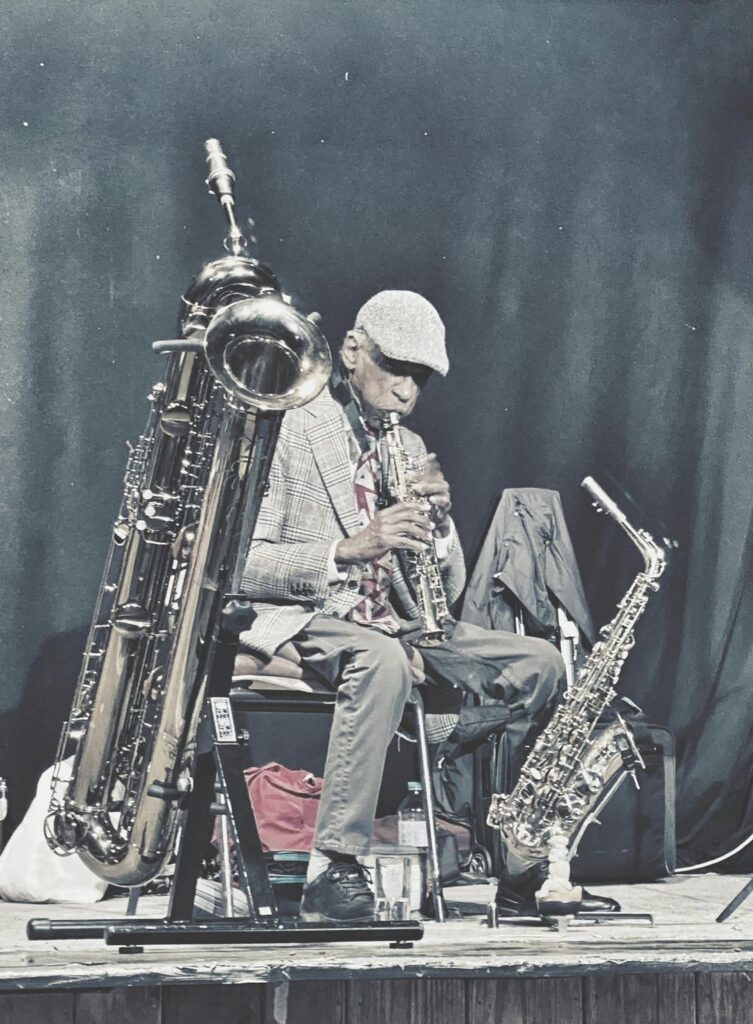
While Konfrontationen still presents American musicians of post-free jazz-fame, the majority of its listeners come from Germany and from former Soviet Bloc-countries. “A big portion of festival goers,” he reports, “consists of promoters of different festivals who come from as far as Romania, Slovenia, Poland or Italy or the countries I still call Yugoslavia. This crowd often camps and stays for a few extra days. They are intelligent people who love this sort of music,” Falb emphasizes. “One of them, the journalist Andrew Choate of American-Romanian descent, is a sort of an insider.”
The greatest part of his fest’s funding comes from its crowd. The local community has embraced the festival’s vibe, from the mayor (of the Socialist party) to the national radio which pays royalties for broadcasting the fest’s musicians.
Roscoe Mitchell’s trio performed a concert at Jazzgalerie on June 11, the last before the festival proper, for some 80 people, mostly from the area between Nickelsdorf and Vienna. Standing with Tani Tabbal, who played his drums off the rhythm pulse, with implements that seemed like something other than sticks, Mitchell praised Nickelsdorf as one of the defining places of his career. (That isn’t mentioned in any of the books about him.)
“Roscoe weighs only 62 kilos,” Falb marvels, “but he played strong – no break! – for one and half hour. Now he wants to put a record of the show out. He called me from London as he listened to it.”
Switching topics: “The biggest problem is to convince the young people to get acquainted with interesting improvised music. It is music with intellect, yes, but it also comes with feeling, and it can be transportive. Austria has a good radio station, Ö1, with one of the most beautiful music programs, comparable to the BBC. Airing the classical contemporary music — free jazz — it really strives to help little promotors like me, which is good”.
This year’s Konfrontation features veterans including bassist William Parker and Austrian pianist Dieter Glawischnig, as well as double bassist Luke Stewart of Irreversible Entanglements’ fame (playing with Ziv Taubenfeld’s Full Sun Octet) and the Silt Trio with drummer Chad Taylor and saxophonist Brian Settles. The rest of the program presents Austrian players and their counterparts from Berlin and Amsterdam, with the Music in Movement Electronic Orchestra led by producer-guitarist Christian Fennesz paying tribute to its late members Pita Rehberg and Cor Fuhler. It is rumored that food will be provided by legendary Austrian cook Patrick Müller of Silent Cookie fame.
Recently the festival has attracted academic interest. Nickelsdorf native Philipp Schmickl is publisher of the Theoral series of in-depth interviews and a post-graduate student at the Conservatory of Music at the University of Graz. He intends to write his Ph.D. thesis, titled “Centrisms on the periphery?” about the development of the annual gathering that has been a pillar of the global improv circuit.
“All of the people who take part in the festival — the musicians, audience, organizers, volunteer-workers, etc. — they all have good and sometimes even outstanding experiences at this festival, Schmickl explains. “The music is central, without it there would have never been a festival, and without this music, it would have been a different festival. I think free jazz and improvised music – including that with electronic instruments – has been the central force that united and, year after year, re-united the people who were ready and willing to go on organizing and supporting the festival. Audience as well as the musicians,” Schmickl reiterates.
This University of Vienna anthropology scholar began his relationship with the festival in his youth. He’d do the kitchen work for it, make sandwiches, clean the backyard, brew coffee and work at the bar. In 2009 he was responsible for the book tell no lies claim no easy victories / L’improvisation ne s’improvise pas, published for the Konfrontationen’s 30th anniversary. His duties evolved to writing grant and subsidy applications.
“I’m always at the Jazzgalerie for preparations and to do some correspondence the week before the festival. I first got in touch with improvised music 15 years ago, when I heard Doug Hammond on drums and Muneer Abdul Fatah on cello in the basement club. We youngsters were allowed to enter for free and so we went downstairs and I remember standing there, watching, and hearing deep arco sounds. I did not move, the music felt really good and made me so curious that I stayed when my then-friends went back up to get another drink. Eventually, I also left club and went upstairs, but the experience was made and I remember it vividly until this day. It was the first of the many outstanding experiences I’ve had at the Jazzgalerie and the Konfrontationen since then. I have no single favorite.”
Although he now lives in Graz and doesn’t visit the Jazzgalerie often, Schmickl still feels entirely connected to this place and certain people, especially Hans Falb, “who was a teacher and a mentor for me during my youth and later turned into a friend.”
If one had to relate Hans Falb to an artist from another discipline, who would that be, I wonder.
“Listening to [drummer] Hamid Drake speaking about [late tenor saxophonist] Fred Anderson [a stalwart of Chicago’s AACM/Association for the Advancement of Creative Musicians], I thought, ‘Wow, sounds like Hauna!.’ I also mention this in the foreword of Theoral No. 12. The central issues that Hans valued during his travels in West Africa and has realized at and with the Jazzgalerie are generosity and hospitality — Gastfreundschaft. And he embodies the drive to go on, to move on, no matter how dire the circumstances may be,” Schmickl concludes.

